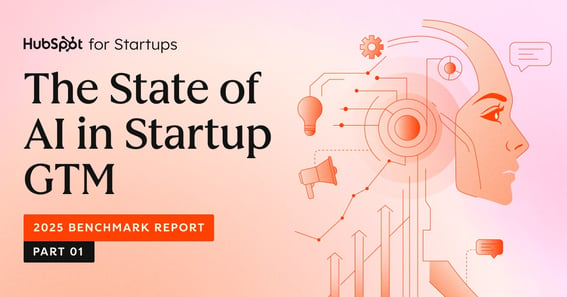Introduction
So, your startup C-suite is filling out with a CEO, CFO, COO, and maybe even a CTO. But is it time to hire a CAIO?
A CAIO, or chief AI officer, is a role that is growing in demand for organizations of all sizes, including startups.
As CIO Dive reported, the number of CAIOs employed by organizations increased 70% year-over-year from 2023 to 2024. By 2025, the number of companies with a chief AI officer reached 16%, according to a survey by Foundry. The Foundry survey also found that another 44% of respondents are seeking, or are at least interested in adding, a CAIO for their organizations.
As AI adoption continues to skyrocket, businesses must be prepared to skillfully adopt, implement, and govern AI. Here’s what you can expect from a CAIO and how to determine whether your startup needs a chief AI officer.
TL;DR: Should your startup hire a chief AI officer (CAIO)?
- CAIO role growing rapidly: The number of chief AI officers increased 70% year-over-year from 2023-2024, with 16% of companies employing CAIOs by 2025 and 44% more considering the addition.
- Key responsibilities include: Developing AI strategy, overseeing implementation and training, ensuring legal compliance and cybersecurity, establishing ethical AI usage policies, and tracking AI performance ROI.
- Startups with dedicated AI leadership see higher revenue: Companies with a CAIO or AI team are more likely to reach $5M-$20M in annual recurring revenue, with 14% achieving $20M-$50M ARR compared to just 2% without dedicated AI resources.
- Best-suited industries: Tech, fintech, professional services, manufacturing, healthcare, and highly regulated sectors benefit most from CAIOs due to high AI ROI and compliance requirements.
- Main hiring challenges: Average CAIO compensation exceeds $1M annually, making cost a primary concern for early-stage startups; consider fractional CAIOs or AI advisors as alternatives.
Defining the chief AI officer role
A chief artificial intelligence officer, also called a chief AI officer or CAIO, is an executive or leader who oversees all AI implementation and usage within a company. The CAIO helps build AI implementation strategies for the organization and keeps up-to-date on the latest AI tools to consider for the company.
Some of the main responsibilities and expectations of a CAIO include:
- Research AI and AI tools
- Develop and oversee an AI strategy for a business
- Oversee AI implementation and training within the company
- Ensure AI complies with the law
- Manage AI-related cybersecurity
- Develop and oversee ethics for AI usage
- Develop an AI usage policy for the company
- Lead on talent acquisition for AI
- Track KPIs to measure AI performance and ROI
- Manage AI adoption and usage across departments
CAIO vs. CIO vs. CTO
A CAIO is different from a chief information officer (CIO) or chief technology officer (CTO), because this executive deals solely with artificial intelligence. CIOs handle the company’s existing information infrastructure, such as computer systems, for security and stability. The CTO is responsible for developing and implementing technology to suit the company’s (and its customers’) needs.
Ultimately, these leaders will need to work together to ensure any AI implemented or developed by a company works with the company’s existing tech stack and helps the company meet its goals.
Strategic value of a CAIO in startups
You’ll need to consider the value and impact of adding a CAIO to determine whether it’s a good choice for your startup, but don’t forget to consider the challenges that can come with hiring for this role.
Benefits of CAIO
Adding a CAIO to your startup can come with several benefits, both from increasing innovation and opportunity within your organization and by reducing financial losses from implementing less effective AI tools.
Some of the benefits of hiring a chief AI officer include:
- Waste less time and money on AI tools that are misaligned with the business
- Establish a more effective and targeted strategy for AI adoption and implementation
- Increase skill-building opportunities for employees
- Reduce cybersecurity and non-compliance risks
- Maintain competitive advantage by incorporating state-of-the-art AI that aligns with your startup
- Obtain useful data on AI usage that can help guide business decisions
- Establish comprehensive AI implementation strategies that roll out the technology company-wide
- Keep pace with rapidly evolving AI technology
Challenges in hiring a CAIO
One of the primary challenges to hiring a CAIO, especially for early-stage startups, is cost. Cost is already a top concern for startups adopting AI, according to the AI in Startup GTM Strategy Report by HubSpot for Startups. The report found that 25% of surveyed startups at the Series A through D stages said cost was their biggest concern for AI implementation.
The expected salary range for a CAIO varies widely, from the low to mid-$200,000s to nearly half a million, as reported by Glassdoor, to over $1M, as Fortune reported. This further presents a challenge to startups with tight budgets.
Although it’s growing rapidly, AI is still a newer technology, and it could also be difficult to find candidates with the balance of AI skills and leadership experience to consider for this role.
Another challenge to keep in mind when onboarding a CAIO is to avoid adopting AI just for the sake of it. While having a CAIO is beneficial, this leader and the leadership team need to be transparent and efficient. AI won’t be the answer to everything, so it’s important for the CAIO to consider all possibilities, including basic and cost-effective solutions, over AI as needed.
Industries best suited for CAIOs
AI is becoming ubiquitous across industries, with many use cases from tech to healthcare to consumer goods. However, a chief AI officer can be better suited to companies in certain industries over others.
For example, companies in tech, fintech, professional services, and manufacturing are already seeing high returns in marketing, sales, and customer service, according to Part 2 of our AI in Startup GTM Strategy Report. For instance, 30% of financial services and fintech companies reported that the enhanced personalization from AI is a top marketing benefit of this technology, while 38% of manufacturing respondents said the top sales benefit of AI is the improvement in efficiency and productivity.
Startups within these industries are well-poised to bring a CAIO on the team. Companies in highly regulated industries, including financial services, healthcare, and energy, could also greatly benefit from the AI governance and compliance that a CAIO offers.
Businesses in highly competitive industries like technology and retail are prime candidates for a CAIO to stay ahead of the curve.
While there are exceptions, some industries may not be as well-suited to needing a CAIO. Industries like agriculture, the arts, textiles, and food may not need a CAIO, but it will vary from company to company, as some companies in these industries are implementing AI and innovating with this technology.
CAIO impacts
For startups, hiring a CAIO can have huge impacts, particularly for developing and implementing GTM strategies and scaling successfully.
According to the AI in Startup GTM Strategy Report, startups with a dedicated AI leader or team were more likely to have an annual recurring revenue (ARR) between $5M and $20M, compared to startups with no dedicated AI team or that rely on existing teams to take on AI governance with less than $1M in ARR.
Further, 14% of startups with a dedicated AI lead or team reached ARR of $20M to $50M, where only 2% of startups without any dedicated AI team or resources reached that level.
On a more granular level, AI is impacting GTM across the board, with report respondents finding that personalization, ad targeting and optimization, and content generation as some of the top ways AI is improving marketing efforts.
In sales, the data showed the biggest benefits for startups as improved sales efficiency and productivity, increased forecast accuracy and pipeline visibility, and enhanced customer personalization and engagement.
On the customer service front, AI has helped startups reduce costs, provide 24/7 support, and improve the overall customer experience.
A CAIO can help amplify these benefits by ensuring your AI adoption follows a strong strategy, aligns with company goals, and complies with legal and ethical standards.
Does your startup need a CAIO?
You can only truly get the most from hiring a CAIO and using AI in the workplace if there’s a need for one within your startup. Consider this checklist when determining whether you should add a CAIO to your startup:
 Your startup operates in a highly competitive industry.
Your startup operates in a highly competitive industry.
 You’re developing AI for your products or services, or AI is a central component of your products or services.
You’re developing AI for your products or services, or AI is a central component of your products or services.
 You plan to dedicate more than 25% of your GTM tech stack to AI tools.
You plan to dedicate more than 25% of your GTM tech stack to AI tools.
 You plan to dedicate more than 20% of your total tech budget to AI tools.
You plan to dedicate more than 20% of your total tech budget to AI tools.
 AI is deeply integrated into your company’s business plan or workflows.
AI is deeply integrated into your company’s business plan or workflows.
 Multiple teams or departments in your business use AI regularly.
Multiple teams or departments in your business use AI regularly.
 You don’t already have a dedicated lead or team managing AI.
You don’t already have a dedicated lead or team managing AI.
 You're dealing with sensitive data that requires careful AI governance.
You're dealing with sensitive data that requires careful AI governance.
 AI-related risks could significantly impact your business.
AI-related risks could significantly impact your business.
 You want to implement significant AI projects in the next 12 to 18 months.
You want to implement significant AI projects in the next 12 to 18 months.
 AI-related decisions for the startup require collaboration across multiple teams or leaders.
AI-related decisions for the startup require collaboration across multiple teams or leaders.
However, if you’re a pre-seed startup with only a few employees, you’ll need to focus more on building the basics of your startup, like the business plan, before looking ahead to AI governance. If you want to weave AI into your business early on, though, you can consider hiring a fractional CAIO or an advisor with deep AI experience to help guide AI usage and strategies for early-stage startups.
Conclusion: making an informed decision on hiring a CAIO
Appointing a CAIO can help your company develop a cohesive, forward-thinking, ethical, and legally compliant AI strategy that keeps your company competitive and efficient.
But hiring another executive and investing heavily in AI can come with high upfront costs to consider, and you’ll want to make sure your company is at the right stage and in a strong industry that will support AI to this degree.
Startups should evaluate their specific business needs for AI and what they hope to achieve with this technology, then assess their AI readiness to determine whether hiring a CAIO is the right business move.
Check out how other competitive startups are investing in AI in the AI in Startup GTM Strategy Report benchmark report, then explore benefits and use cases in the AI in GTM Playbook, or see AI predictions for 2026 and beyond in the third part of the report.




